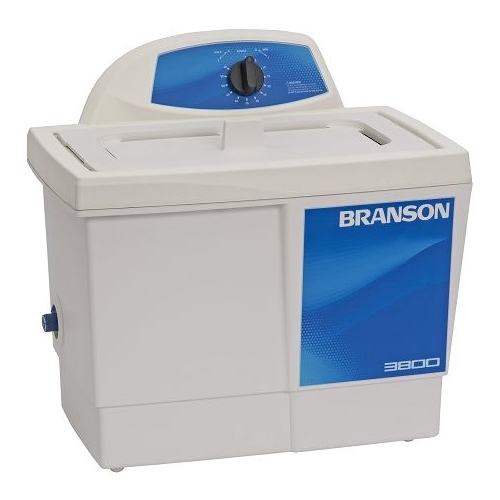 |
 |
 |
 |

Popular Alternative Choice
Branson M3800 Mechanical Ultrasonic Cleaner
- Branson M3800: 40kHz transducers with advanced sweep frequency.
- Design: Raised control panel prevents solution damages.
- Applications: Cleans precision parts and suitable for lab functions.
- Consistency: Power tracking ensures uniform cleaning always.
Go to Product Details
Free Shipping and No Lead Time!
Branson 3510 Ultrasonic Cleaner
The Branson 3510MT Ultrasonic Cleaner is designed for
performance, control, durability and reliability for a variety of applications.
The 1.5 gallon Branson 3510MT is powerful enough to remove heavy oils, buffing compounds,
proteins, consistent enough to manage difficult laboratory cleaning, and safe
enough for delicate components or fine jewelry. Ultrasonic sound waves move
through a cleaning solution, creating an effect called cavitation, which is the
rapid formation and collapse of microscopic bubbles.
The 40kHz transducers provide increased cleaning power with built-in sweep frequency for uniform cleaning throughout the bath. Features mechanical timer.
All of our equipment is fully tested to perform at factory
specifications before being shipped.
Included with the Branson 3510 Ultrasonic Cleaner:
Includes:
> Tray > Power Cord > Full 180 Day Parts and Labor
Warranty
Branson 3510 Ultrasonic Cleaner Specifications
|
Tank Size (L x W x D)
|
11.5” x 6” x 6”
|
|
Overall Size (L x W x D)
|
18” x 12” x 16”
|
|
Frequency
|
40 Hz
|
|
Weight
|
15 lbs
|
Branson 3510 Ultrasonic Cleaner Manual Click Here to View all the Technical Specs for the Branson 3510 Click Here to View all the Technical Specs for the Branson 3510
- Verify that the power supply and PCB are delivering stable and correct voltage outputs to all essential circuits
- Inspect the display for any dim, dead, or flickering pixels, replacing affected areas to maintain clear and accurate readings
- Confirm that all buttons and knobs function fully, providing precise and reliable input control
- Verify that the timer, degassing function, sonics, and heating elements are working properly, ensuring full operational capability
- Check the lid for signs of damage, warping, or wear, replacing as needed to maintain a secure seal
- Inspect the tank for any holes, rust, or other damage, confirming it remains structurally sound
- Confirm there are no fluid leaks within the tank to ensure operational safety
- Inspect for any internal leaks that may compromise performance or safety
- Examine internal wiring for tears, breaks, or worn areas; replace any components that do not meet performance standards
- Inspect internal insulation for wear or degradation, replacing where necessary to maintain thermal efficiency and safety
- Load a prepared sample into the ultrasonic cleaner, testing to confirm proper ultrasonic function and cleaning efficacy
- Verify temperatures using a NIST-traceable temperature probe to ensure accuracy
- Conduct a thorough cosmetic inspection to confirm all surfaces and components meet quality and aesthetic standards
Technician Inspection and Recertification Checklist: Ultrasonic Cleaner
The Following Checklist Is to Be Performed on All Incoming and Outgoing Pieces of Equipment
|
Task
|
Completed?
|
Remarks?
|
|
Verify stable, correct voltage outputs from power supply and PCB to circuits
|
Completed
|
|
|
Inspect display for dim, dead, or flickering pixels; replace as needed
|
Completed
|
|
|
Confirm full functionality of all buttons and knobs for reliable input control
|
Completed
|
|
|
Verify proper function of timer, degassing, sonics, and heating elements
|
Completed
|
|
|
Check lid for damage, warping, or wear; replace if needed for secure seal
|
Completed
|
|
|
Inspect tank for holes, rust, or damage to confirm structural integrity
|
Completed
|
|
|
Confirm absence of fluid leaks within tank for operational safety
|
Completed
|
|
|
Inspect for internal leaks that may compromise performance or safety
|
Completed
|
|
|
Examine internal wiring for tears or breaks; replace components as needed
|
Completed
|
|
|
Inspect internal insulation for wear; replace to maintain thermal efficiency
|
Completed
|
|
|
Test ultrasonic function by cleaning a prepared sample to confirm efficacy
|
Completed
|
|
|
Verify temperature accuracy using a NIST-traceable temperature probe
|
Completed
|
|
|
Conduct cosmetic inspection to confirm quality of surfaces and components
|
Completed
|
|
To View More of Our Recertification Protocol Click Here
|
|
 |
 |
 |
 |

|


